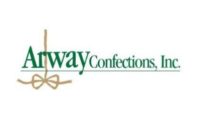With all respect to the famed 19th century British prime minister, most people aren’t ever really ready when opportunity comes knocking. In Craig Leva’s case, it practically tip-toed in and then — after dozing some — accelerated into warp speed. Blink and it would have been much harder to catch this twist of fortune.
The process began gently enough with an e-mail query: Would you be interested in acquiring Long Grove Confectionery if it were for sale?
As Leva, president and ceo of Chicago-based Arway Confections, relates, his response to Dwayne Hallan, v. p. of manufacturing at Long Grove, was more of a lukewarm maybe than an energetic and excited “I’m interested.”
“We had just come off a record year; sales were up by 25 percent,” he says. “We had what we believed was the perfect triangle: satisfying our customers, taking care of our suppliers, and keeping our employees happy.”
As a result of the success, both financially and operationally, Leva was able to take a bit more time for himself and his family, no small feat for a confectionery entrepreneur. Hence, would acquiring a Chicagoland icon ruin a successful business model that had taken years to create?
Hallan. Thinking he had dropped the ball, Leva called Hallan, who in turn, was surprised that John Mangel, Long Grove’s owner, hadn’t contacted Leva.
Upon returning from vacation on Wednesday, June 5, the two exchanged voice mails.
“It was Thursday morning just as I was pulling into the driveway at Arway that I received a call from John,” says Leva. “He asked if we could meet this morning. I explained to him that I had just gotten back from vacation and needed to spend some time in the office. I suggested meeting him for cocktails. He countered with lunch. I agreed.”
What had become as a gentle knock via e-mail was suddenly gaining velocity and strength. After several hours of discussion and a tour of the facility, Leva returned to Arway’s offices in Chicago to discuss the possibly of making an acquisition with his management team.
Rick Johnson, general manger, and Chris Perkins, sales manager, were ecstatic. A wry smile forms on Leva’s face as he recalls the conversation.
“They quickly seized on the immediate availability of adding production capacity to meet Arway’s double-digit growth. At the end of last year, we all realized that we would have to add production capacity or otherwise be forced to minimize growth,” he says. “It became clear we wouldn’t be able to pull off another record year without additional space and equipment.”
As Johnson and Perkins pointed out, the Long Grove facility not only operated the same equipment; it also ran similar product. Moreover, the 10-year-old, 85,000-sq.-ft. plant had plenty of warehousing space.
Leva, while agreeing to the reasons for the acquisition, said it was necessary to step back and take a longer look at the move.
“I told them, ‘Let’s sleep on this,’” he adds.
For Leva, it was rather a sleepless night. In reviewing the pros and cons in doing such a deal, he quickly tabulated the plusses: The facility came with a trained staff; its product lineup complemented Arway’s existing business, it came with established sales, and this business was in “our wheelhouse.”
As he drifted off to sleep, he thought — all things considered — that the deal “made sense.”
That next morning, Leva called one of his chocolate suppliers to get yet one more opinion on the possibility of acquiring Long Grove. Without hesitation, the supplier responded positively. There was one thing, however — word on the street was that the company was shutting down and letting go of its employees.
Leva immediately called Mangel, asking him why he hadn’t informed him of that fact yesterday. The former Long Grove real estate maven simply explained that he had run out of options.
“As I told John, I was interested in the business, but not without the employees and its customers,” Leva says.
Mangel responded by saying to Leva if he was serious he should bring over his lawyer and negotiate a deal that day. Well, easier said than done. Bringing in high-priced talent on a moment’s notice to discuss a business deal on a beautiful Friday summer afternoon isn’t necessarily that straightforward. Nonetheless, face-to-face discussions were held that Saturday morning, and a deal was reached within a few hours.
“Basically, I was buying the company, its real estate, and hiring back all of the employees sight unseen, without having any due diligence process. It was a huge risk.”
A whirlwind weekend involving contacting employees ensued, thereby enabling all the former administrative staff to return to work that Monday, and production staff on Tuesday.
“I wanted to have Long Grove’s doors open doing business that Monday,” Leva explains. “I didn’t want customers to start searching for other suppliers.”
On Wednesday, June 12th, Leva and Mangel signed and closed the deal.
That next day, after all the papers were signed, he met with all the employees for the first time.
“I told everyone that the good news was that I was actually qualified for the job, with more than two decades of experience in the confectionery industry, but still young enough [45] that I had a lot more energy to give.”
Enthusiasm aside, Leva realized that the acquisition posed several challenges for the Arway team. As he points out, Long Grove had been losing money for several years now. And while there were several immediate “low-hanging fruit” solutions available, making this opportunity work was going to be the “biggest challenge of my professional career.”
“Long Grove is a great company, with a great staff and great product,” Leva adds. “The facility, however, was built for a $40-million operation, not a $10-million business. It was too big for their own well-being.”
There were several positives, however, to be thankful for. First, in closing the deal, Mangel saw that all creditors were paid off. This allowed Leva to approach suppliers — many of which already dealt with Arway — with a clean slate.
“Arway has always maintained great relationships with its suppliers, which has enabled us to get extremely competitive pricing from commodities to packaging,” Leva points out. That was not the case for Long Grove.
The second benefit involved products. Each company had more than 200 items, surprisingly with little duplication. This meant the newly formed entity could offer a new expanded product list of nearly 400 items.
In addition, there was a customer list that also had little duplication. Overnight, Arway picked up 500 new customers.
Then there’s the equipment and employees. Long Grove employs 100 production workers. It has four 60,000-lb. Chocolate holding tanks that can feed four enrobing lines, panning equipment and a moulding line. The plant also has a kitchen with copper kettles capable of making a broad range of products, from barks and peanut brittles to caramels and snack bars.
The company was also able to retain Dwayne Hallan, a 35-year operations veteran and an individual critical to consummating the deal, adds Leva. Add to that a research and development professional, something Arway didn’t possess,As well as SQF and organic certification, and the potential bonuses started to add up.
Still, it was clear that none of these would matter if Leva couldn’t address the key reason for Long Grove’s demise: sufficient volume.
“For this acquisition to work, we need to manage the business and pump more volume through the plant,” Leva explains. Given Arway’s production capacity crunch, it will only be a few months before the Long Grove facility starts making some of Arway’s products, most likely in October.
Anxious to introduce some of Arway’s operating practices into Long Grove as quickly as possible, Leva recognizes that the two Have different product streams. Whereas Arway’s line of confectionery products tend to run on the bulk side, lending itself to efficient, high-volume runs; Long Grove’s product stream often involves detailed customization and high-end packaging.
It is, as Hallan describes, designed to produce upscale, high quality gift items, gift items that often involve intricate packaging.
Leva and his management crew realize that. As he points out, everything is being handled thoughtfully, from honoring seniority and vacations to re-introducing company uniforms in production.
“We are working around their systems,” he says.

|
At a Glance
Arway Confections / Long Grove Confections |
Leva is also looking to take advantage of several of Long Grove’s existing strength’s — such as its brandname recognition in Chicagoland as well as its retail store and built-in factory tour setup.
Located in the heart of Long Grove Village, a quaint, nostalgic retail center in Long Grove, the retail shop continues to be the flagship spot of that tourist attraction. Although annual sales have dipped, a reflection more on the village center than on the shop itself, Leva believes a bit more marketing and promotion would re-invigorate the store’s revenues.
“One of the first things my mother said upon hearing that I had acquired Long Grove was that I don’t dare close the retail shop,” Leva says.
The factory tours, which have also dipped because of a lack of marketing and promotional support, will also be revitalized. As Leva points out, the facility features an in-house theater, an elevated walkway with large picture windows looking into the production areas, customized Wallpaper on the other side of the walkway telling the story of chocolate, and several sculptured reproductions of famous paintings done in chocolate.
The tour ends with a visit to the company’s outlet store, which now features a mix of both Long Grove and Arway’s product line. Given the popularity of confectionery factory tours nationwide, it’s not hard to imagine a large uptick in tours, accompanied by the resulting boost in factory outlet sales.
In addition, Leva has several other Long Grove assets he wants to further exploit, such as its recent organic certification.
The facility has a separate production area that allows it to produce organic items, a capability being sought by more and more in the confectionery industry. Leva also holds another ace; the company doesn’t shun smaller customers.
“We’ve seen a big push by our competitors to focus on long-run, bigger volume shipments,” he explains. “I never want to get so big whereby I can’t handle a 500-lb. Order or a mixed pallet containing 15 different items. Put ten of these loyal customers together and in many cases it can become more valuable than having one large customer.”
The addition of Long Grove to Arway has pumped up the company’s sales number to nearly $50 million. That, in itself, doesn’t concern Leva. His emphasis is on making Long Grove a profitable addition to Arway.
“Together, we now can provide customers with a huge variety of confections,” he says.
In reflecting on how the Long Grove acquisition unfolded, Leva says he feels great about the outcome.
“I had been looking for the next step, and really didn’t know what the next chapter for Arway would be. In the end, Arway and Long Grove will be a great combined entity, and I am excited to continue on the journey.”
At a Glance
Arway Confections / Long Grove Confections
Headquarters: Chicago
Plants: Chicago (75,000 sq. ft.); Buffalo Grove, Ill. (85,000 sq. ft.)
Employees: 150
Sales: $45-50 million (Candy Industry estimate)
Management team: Craig Leva, president and ceo; Rick Johnson, v.p. – operations (Arway); Chris Perkins, national sales manager; Beth Carlisle, director human resources; Dwayne Hallan, v.p. – operations (Long Grove), Kendra Hensley, controller; Deborah Newsam, director of product development






















